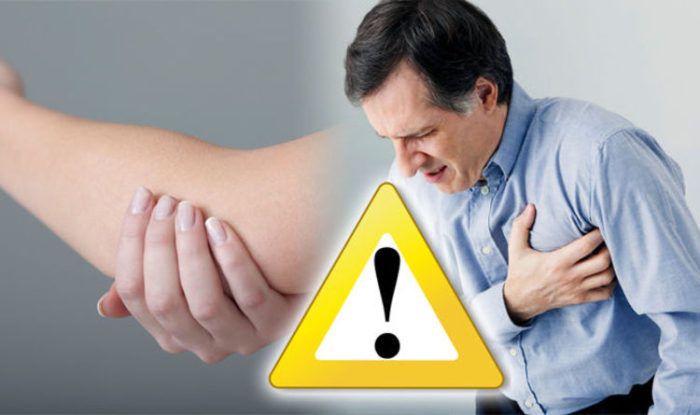

A heart attack is a serious medical emergency whereby the flow of oxygen-rich blood to a section of heart muscle suddenly becomes blocked and the heart cannot get oxygen.
Most heart attacks occur as a result of coronary heart disease where the coronary arteries become narrowed by a gradual build-up of fatty material.
While a heart attack does not always cause death, complications can lead to a fatal consequence.
As well as shortness of breath, feeling week or lightheaded and an overwhelming feeling of anxiety, pain travelling from the chest to the arms is also a sign – but which arm is it that tends to hurt during an attack?
According to NHS Choices, it is usually the left arm which is affected, but it can affect both arms.
But pain can travel to other parts of the body from the chest, not just to the arms.
Those who experience a heart attack may also experience pain which travels to the jaw, neck, back and abdomen.
Other symptoms and signs of a heart attack the NHS lists include sweating, feeling sick or being sick and coughing or wheezing.
If you suspect any symptoms of a heart attack call 999 immediately and ask for an ambulance.
The NHS website advises: “Don’t worry if you have doubts. Paramedics would rather be called out to find an honest mistake has been made than be too late to save a person’s life.”
As the NHS states, sweating profusely could be an early sign of a heart attack, especially if the patient is not exercising or being active.
Pumping blood through the body becomes more difficult when the heart becomes weaker, so the body uses more energy to deliver the blood supply.
To cool itself down after the assertion, the body may sweat more than usual.
It is recommended to see a GP if you experience cold sweats, or clammy skin.
“The typical heart attack symptoms include chest pain, shoulder and arm pain, and neck and jaw discomfort,” said Dr Catherine Ryan, Project Co-ordinator of Medical-Surgical Nursing at the University of Illinois.
“Bells should ring off if a person suddenly starts sweating profusely.
“They shouldn’t think they have the flu. If they don’t have fever, then they should start to thing about something else.”
more recommended stories
 Fentanyl Seizures at Border Continue to Spike, Making San Diego a National Epicenter for Fentanyl Trafficking
Fentanyl Seizures at Border Continue to Spike, Making San Diego a National Epicenter for Fentanyl TraffickingFentanyl Seizures at Border Continue to.
 Utah Man Sentenced for Hate Crime Attack of Three Men
Utah Man Sentenced for Hate Crime Attack of Three MenTuesday, August 8, 2023 A.
 Green Energy Company Biden Hosted At White House Files For Bankruptcy
Green Energy Company Biden Hosted At White House Files For BankruptcyAug 7 (Reuters) – Electric-vehicle parts.
 Former ABC News Reporter Who “Debunked” Pizzagate Pleads Guilty of Possessing Child pδrn
Former ABC News Reporter Who “Debunked” Pizzagate Pleads Guilty of Possessing Child pδrnFriday, July 21, 2023 A former.
 Six Harvard Medical School and an Arkansas mortuary Charged With Trafficking In Stolen Human Remains
Six Harvard Medical School and an Arkansas mortuary Charged With Trafficking In Stolen Human RemainsSCRANTON – The United States.
 Over 300 People Facing Federal Charges For Crimes Committed During Nationwide Demonstrations
Over 300 People Facing Federal Charges For Crimes Committed During Nationwide DemonstrationsThe Department of Justice announced that.
